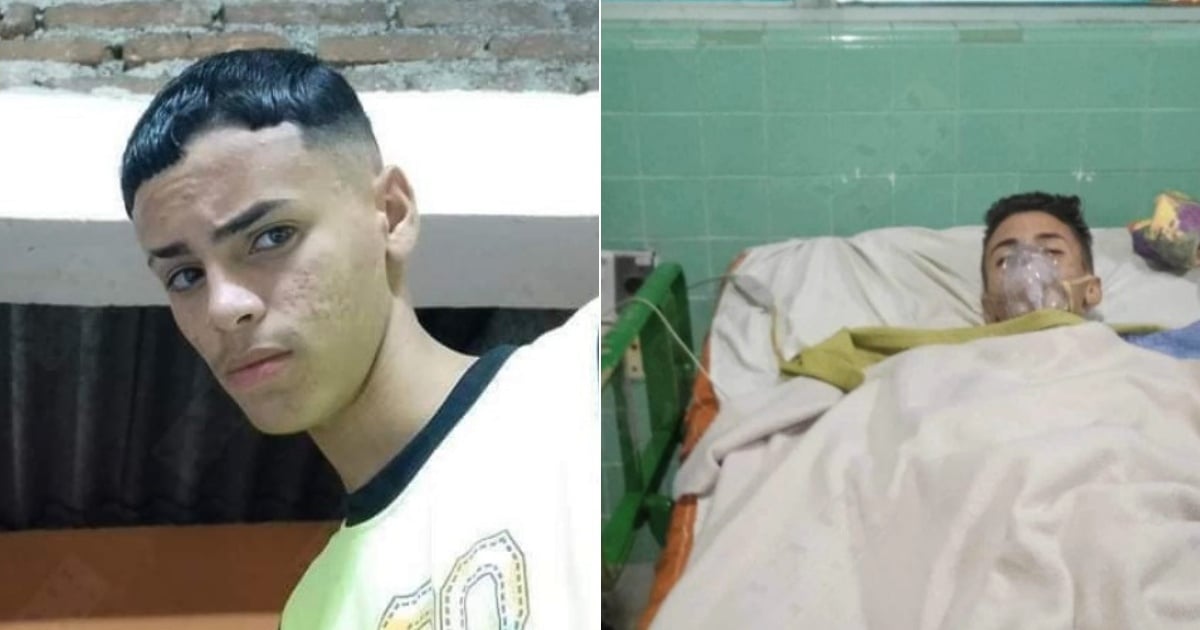Héctor Eduardo Tamayo Burgos, a 17-year-old teenager, has died while hospitalized in Santiago de Cuba without a clear diagnosis of his condition, according to journalist Yosmany Mayeta, citing family sources. The teenager had been admitted for over a week at the South Children's Hospital Dr. Antonio María Béguez César, commonly referred to as "La Colonia."
"Tamayo Burgos was hospitalized without any diagnosis, but after our publication, the doctors went into Intensive Care, and the family was informed that the young man had a 'brain infection,'" added the journalist, referencing a previous report on the case.
The teenager, who was in the 11th grade, lived with his father in the Luis Dagnes neighborhood in the Altamira Popular Council, as his mother is currently incarcerated.
In the comments section of the post, hundreds of netizens expressed their sorrow over the death of the teenager, known as "Tito" to his close ones. As of the writing of this article, there are no further details on the circumstances of Héctor Eduardo Tamayo's death or the illness he suffered from.
Health System Criticism
Cuban activist Irma Broek, whose sister died last April in Camagüey due to alleged medical negligence, lamented the teenager's death in a Facebook post and reiterated that Cuba's public health system is on the brink of collapse.
"Another #victim of the #CubanMedicalImpotence! How many days did this child fight to stay alive? How is it possible that the doctors couldn't identify the origin of his illness to try to treat it properly? Why did they keep him in a regular ward instead of intensive care until his desperate family made the case public, hoping that pressure would make the doctors work to save the young man?" questioned the activist, who resides in Germany.
"It's no secret that the current state of our hospitals is abysmal, with a lack of supplies and empathy from health professionals, and I say this with full conviction," she added.
Broek asserted that most doctors in Cuba attend to their patients when it is too late. She also mentioned that various causes can lead to encephalitis, which seems to have been the final diagnosis in the teenager's case, potentially caused by "a viral infection, an autoimmune inflammation, a bacterial infection, or insect bites, such as ticks or mosquitoes."
"How difficult was it to find a diagnosis for this child? Unbelievable. How long and how many more?" she concluded.
In a previous report, Yosmany Mayeta indicated that Tamayo Burgos had initially been admitted to a "Miscellaneous" ward due to the lack of intensive care beds, until he was transferred to the ICU, where he remained in a vegetative state, with oxygen and other life supports.
The unfortunate death of the 17-year-old occurs amid a complex sanitary situation in Santiago de Cuba, currently facing a severe epidemiological crisis with the confirmed circulation of four viruses: dengue, influenza, oropouche, and SARS-CoV-2, the latter causing COVID-19, according to official sources last Wednesday.
Aris Batalla, a representative of the Red Cross in Santiago de Cuba, warned on Facebook that the presence of these viruses puts the population at risk, urging them to take preventive measures amid a severe shortage of medications such as painkillers and antipyretics.
Meanwhile, the national director of Epidemiology at the Ministry of Public Health (MINSAP), Francisco Durán, acknowledged that the country lacks the fuel needed for mosquito fumigation, amid the rising presence of the Oropouche Virus in Cuba.
In this context, it was reported that the Saturnino Lora Provincial Hospital in Santiago de Cuba is overwhelmed, with no beds or resources to handle the increasing influx of patients.
Health Crisis and Encephalitis in Cuba
The following questions and answers provide further insights into the health crisis and the specific case of encephalitis in Cuba, as highlighted in the article.
What led to the death of Héctor Eduardo Tamayo Burgos?
Héctor Eduardo Tamayo Burgos died from a brain infection after being hospitalized without a clear diagnosis for over a week in Santiago de Cuba.
What is the current health crisis in Santiago de Cuba?
Santiago de Cuba is facing a severe epidemiological crisis with the circulation of dengue, influenza, oropouche, and SARS-CoV-2 viruses, amid a shortage of medical supplies and hospital resources.
How is the Cuban health system currently performing?
The Cuban health system is struggling with significant challenges, including a lack of medical supplies, resources, and adequate patient care, contributing to the system's near collapse.
What are the potential causes of encephalitis?
Encephalitis can be caused by a viral infection, an autoimmune inflammation, a bacterial infection, or insect bites, such as those from ticks or mosquitoes.
